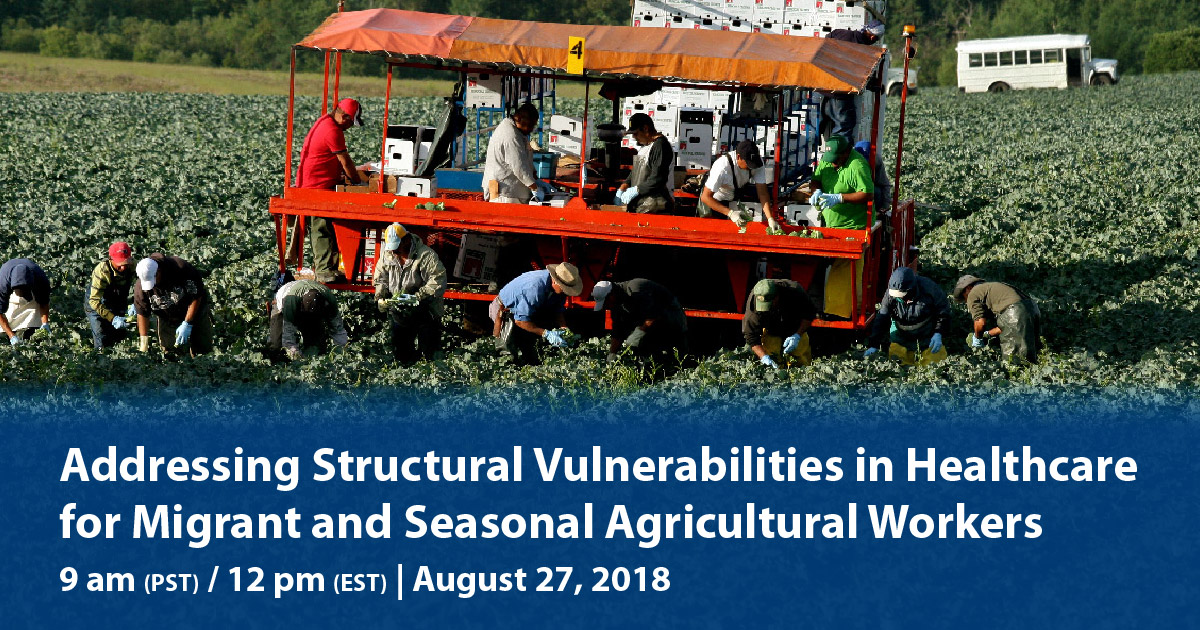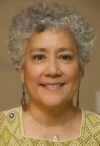
The notion of structural vulnerability addresses the challenges of caring for individual patients within the larger context of power hierarchies, institutional barriers and economic inequalities.
Rooted in the concept of social determinants of health, understanding structural vulnerabilities allows medical students and clinicians to more clearly and critically confront the social structures that make people sick. Migrant and seasonal agricultural workers operate within the cross-section of a number of structural vulnerabilities. In order to effectively meet the healthcare needs of migrant and seasonal agricultural workers, clinicians must be have an understanding of the overlapping social, economic and political challenges facing this population.
In this webinar we will examine the structural vulnerabilities of migrant and seasonal agricultural workers through the lens of immunization disparities, opioid misuse and pain management. The faculty will present a series of case studies to illustrate the real-world impact of structural vulnerabilities on this population. Faculty will also introduce practical tools and information about structural vulnerabilities which can be incorporated into medical education to meet key domains as outlined in the AAMC Competency-Based Learning and Assessment project.
Watch the Webinar Recording
- Participants will be able to identify at least three of the key structural vulnerabilities confronting migrant and seasonal agricultural wrokers.
- Participants will discuss the impact of structural vulnerabilities on disparities in immunizations and in pain management and opioid missuse.
- Participants will explore practical solutions to address structural vulnerabilities in a clinical setting.
- Participants will identify strategies to incorporate education on structural vulnerabilities into medical education.
Presenters

Deliana
Garcia
MA
Migrant Clinicians Network
As the Chief Program Officer for Migrant Clinicians Network, Deliana Garcia has dedicated more than thirty years to the health and wellness needs of migrant and other underserved immigrant populations. Throughout her career she has worked in the areas of reproductive health, sexual and intimate partner violence, access to primary care, and infectious disease control and prevention. Garcia is responsible for the development and expansion of Health Network, an international bridge case management and patient navigation system to make available across international borders the health records of migrants diagnosed with infectious and chronic diseases. She has served as the Principal Investigator or member of the research team for a number of studies addressing topics, such as sexual and intimate partner violence prevention among Latino migrant and immigrant families, trauma in transit for migrants crossing international borders, and emotionally-charged dialogue between patients and health care providers.

Laszlo
Madaras
MD, MPH, FAAFP, SFHM
Chief Medical Officer
Migrant Clinicians Network
As the Chief Medical Officer for Migrant Clinicians Network, Laszlo Madaras, MD, MPH is responsible for the oversight of MCN clinical activities. He also serves as a subject matter expert for various health topics including emerging issues, farmworker health, and Tuberculosis. Over the last 30 years, in parts of Africa, Central America, South America, the Pacific Islands, and the United States, Dr. Madaras has served thousands for wide-ranging ailments, including newly emerging diseases.
Dr. Madaras arrived to in the United States as a Hungarian refugee in 1968 at the age of seven and eventually became a US citizen. Dr. Madaras received his MD and MPH from Tufts University School of Medicine in 1993. Early experiences include working as an Albert Schweitzer Fellow in pediatrics in Gabon, West Africa; as a Peace Corps volunteer in the Congo; and as a pesticide review manager at the US Environmental Protection Agency. He worked on the Congo/Rwandan border during the 1994 Rwandan genocide, and on the Hungarian border with the former Yugoslavia in 1995.
Since 1996, Dr. Madaras has been a board-certified family physician in both inpatient and outpatient medicine in Pediatrics, Adult Medicine, and Obstetrics. He served as a frontline clinician at the Keystone Health Center where he cared for farmworkers and their families and became Assistant Medical Director from 2001 to 2005. In 2005, he became a hospitalist in Chambersburg and Waynesboro Hospitals in south central Pennsylvania, where he continues to work part time. In 2016, he became a Senior Fellow of Hospital Medicine. In 2020, he became a Fellow of the American Academy of Family Physicians.
In addition, Dr. Madaras has worked as a staff physician in Tuberculosis control at the Pennsylvania State Health Department since 2012, and regularly teaches US-based medical students on an international health rotation in Honduras. Dr. Madaras also teaches hospital medicine to Penn State nurse practitioner and physician assistant students and medical residents at Summit Health.